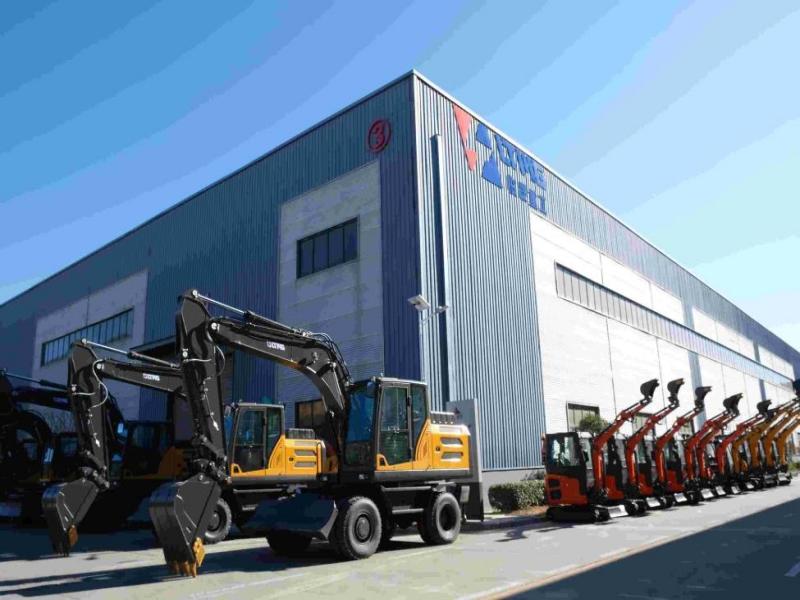How To Determined The Fuel Consumption Of Excavators?
Aug 13, 2024
Fuel consumption is a crucial factor when operating heavy machinery like excavators. Determining the fuel consumption of an excavator is a complex process that involves multiple factors, including the type of excavator, working conditions, operator skills, and maintenance status. It directly affects operating costs, work efficiency, and environmental impact. Therefore, accurately determining excavator fuel consumption is a task every operator and manager must take seriously. This article will explore the steps to calculate excavator fuel consumption, influencing factors, and how to optimize fuel use through proper management.
Definition of Fuel Consumption
Fuel consumption typically refers to the amount of fuel used per unit time or work volume. For excavators, common units include liters per hour (L/h) or liters per cubic meter (L/m³). Evaluating the fuel consumption of an excavator not only reflects the equipment's work efficiency but also significantly impacts construction costs.
Steps to Measure Fuel Consumption
Preparation Work Before measuring fuel consumption, ensure the equipment is operating normally and the necessary recording tools are ready.
Record Before Refueling Before refueling, record the fuel gauge reading and fuel amount (e.g., fuel in the pipe) to understand the initial fuel consumption situation.
Record Working Hours During operations, record the start and end times to calculate the total working hours.
Record After Refueling After completing the work, record the fuel gauge reading and refuel amount again for subsequent fuel consumption analysis.
Calculate Fuel Consumption Subtract the initial fuel amount from the final fuel amount to determine the fuel consumed during the excavation task. Then, divide this value by the hours recorded on the hour meter to get the fuel consumption rate (unit: liters per hour (L/h)).
Data Analysis and Comparison
After measuring fuel consumption, compare it with the fuel consumption standards provided by the excavator manufacturer to determine if it is within the normal range. If fuel consumption is found to be high, analyze the following aspects:
Construction Process: Check for repetitive or inefficient work.
Equipment Condition: Inspect for equipment issues like hydraulic leaks or clogged filters.
Operating Methods: Analyze for poor operating habits, such as rapid acceleration or sudden stops.
Suggestions to Reduce Fuel Consumption
Train Operators Improve operators' skill levels and teach them fuel-saving operations and how to plan work routes efficiently.
Use Quality Fuel Choose high-quality fuel to avoid increased consumption due to inferior fuel.
Scientific Scheduling Arrange construction plans and tasks reasonably to minimize unnecessary downtime and improve work efficiency.
In daily excavator operations, fuel efficiency is a key focus. Effective management and optimization of the following factors can not only reduce fuel consumption but also improve overall work efficiency and equipment lifespan:
Regular Maintenance The performance of an excavator is closely related to its maintenance status. Regularly inspecting and maintaining the equipment, including changing oil, cleaning filters, and checking the hydraulic system, can ensure the excavator is always in optimal working condition. When mechanical parts are worn or clogged, the equipment may require more energy to complete the same work, leading to increased fuel consumption. Therefore, establishing a systematic maintenance plan helps reduce failure rates, extend equipment lifespan, and enhance fuel economy.
Control Load Capacity During operations, it is essential to monitor the excavator's load capacity. If the load is too heavy, the machine will have to exert more power to complete the task, thereby increasing fuel consumption. Properly assessing the material weight for each task and appropriately distributing the workload can optimize fuel usage. Additionally, knowing the equipment's maximum load capacity and avoiding overload operations can improve fuel efficiency and prevent premature wear and failures.
Optimize Operating Conditions The construction environment significantly impacts the fuel consumption of an excavator. Complex terrain, different soil types, and weather changes directly affect work efficiency. For example, working on rocky, muddy, or sloped areas presents greater resistance to the excavator. Therefore, assessing the worksite conditions beforehand and choosing the right time and method for operations can effectively reduce unnecessary fuel consumption. Additionally, utilizing technological tools such as terrain analysis software can help operators better plan construction processes, further improving fuel efficiency.
By systematically addressing and improving the above aspects, operators can significantly enhance the fuel economy of excavators, reduce operating costs, and improve overall construction project efficiency. Overall, good maintenance habits, proper load control, and optimizing operating conditions are crucial components for improving excavator fuel efficiency.
Case Analysis
Case 1
A construction site using a large excavator for earthwork found that the equipment's fuel consumption reached 15 liters per hour under high load conditions, increasing construction costs. Analysis revealed that improper operation by the operator and poor site drainage were the main reasons for the high fuel consumption.
Case 2
Another site using a small excavator for landscaping found fuel consumption to be 8 liters per hour after two days of testing. By planning the work routes more efficiently, fuel consumption significantly decreased, and operators, after training, could accurately choose the right techniques and equipment, thereby improving construction efficiency.
Accurately measuring the fuel consumption of an excavator is not only about the economic operation of the equipment but also involves the overall efficiency of construction projects. By standardizing procedures, reasonable operation, and scientific management, fuel consumption can be effectively reduced, achieving cost savings. It is hoped that this article helps you better understand the methods for calculating and managing excavator fuel consumption.

